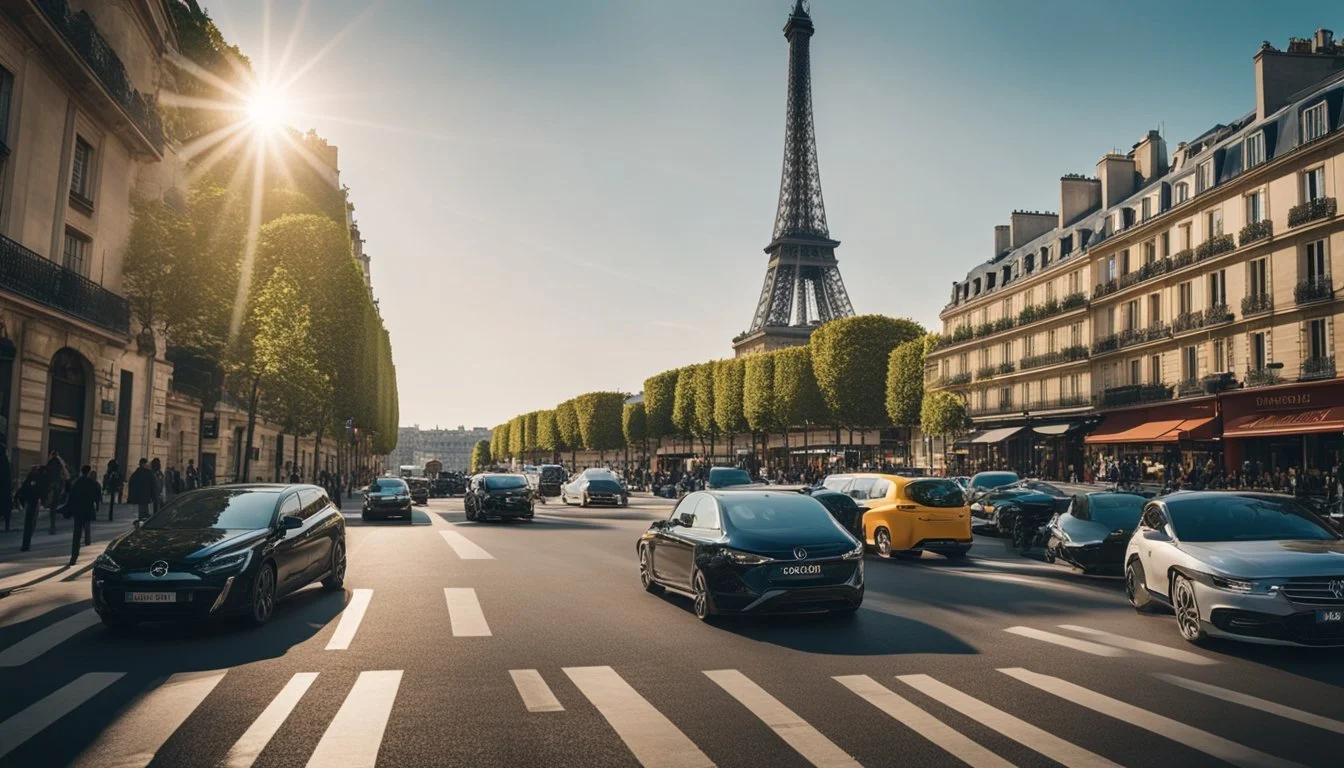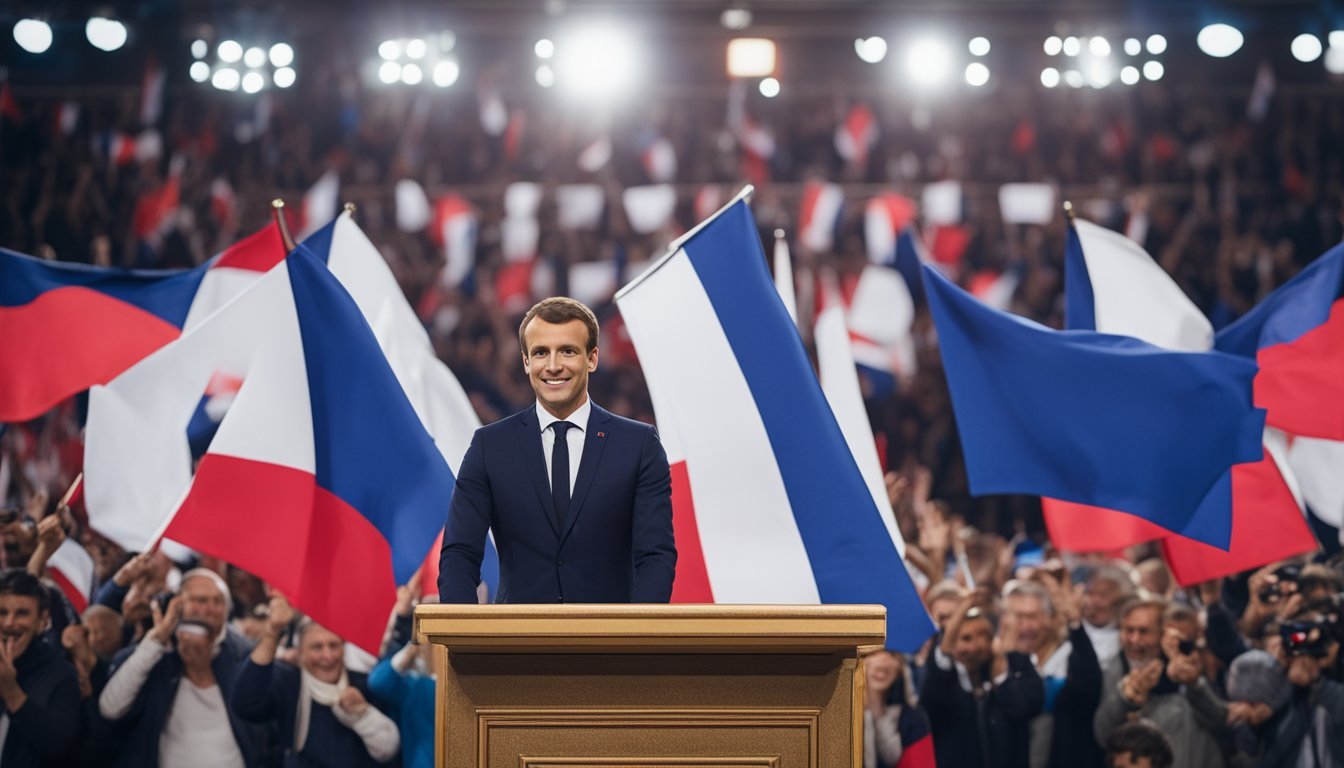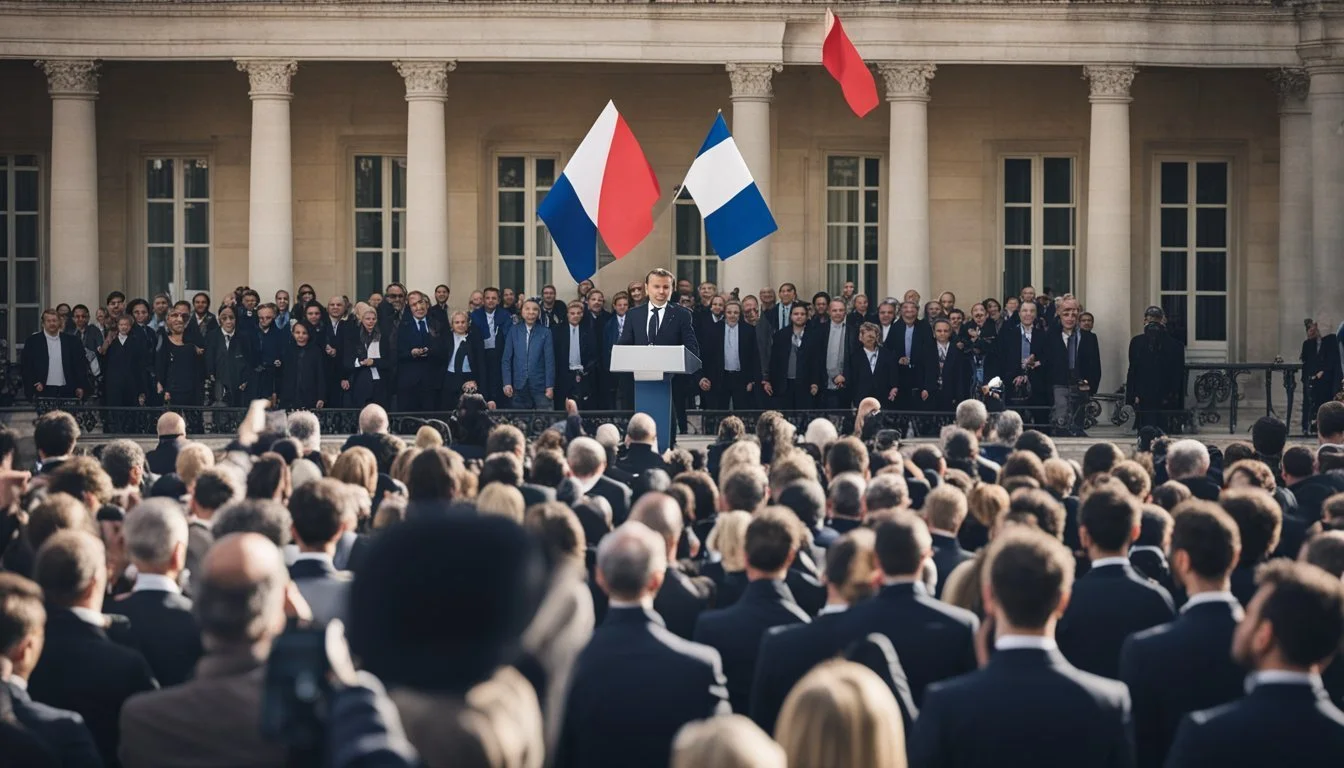10 Films Examining the Presidency of Emmanuel Macron
An In-Depth Look at Leadership
Emmanuel Macron's presidency has been an extraordinary journey marked by dynamic political strategies, international negotiations, and significant domestic reforms. The intersection of his personal story with his professional undertakings offers a rich tapestry for filmmakers to explore, providing audiences with deep insights into his leadership and vision for France. This article delves into 10 films that chronicle various aspects of Macron's tenure, highlighting key moments and decisions that have defined his time in office.
From documentaries capturing the tense negotiations between global leaders to dramatized accounts of his campaign trail, these films serve as essential viewing for anyone interested in contemporary politics. They not only shed light on Macron's policies and political maneuvers but also reveal the complexities and challenges faced by modern-day leaders.
1) The Rise of Macron
"The Rise of Macron" (2017) offers a behind-the-scenes look at Emmanuel Macron's remarkable political ascent. Directed by Yann L'Hénoret, this film chronicles Macron's journey from a relatively unknown figure to becoming the youngest president in French history.
Over the course of eight months, the documentary captures key moments of Macron's campaign for the French presidency.
The camera crew followed Macron and his team as they navigated the highs and lows of election season.
Viewers gain insight into Macron's strategies, challenges, and the dedication of his team.
The film also highlights Macron's transition from his role as Deputy General Secretary at the Elysée to a candidate for the presidency.
The intimate access provided allows a fuller picture of Macron's determination and the efforts that contributed to his success.
For more information, visit the IMDb page for "The Rise of Macron."
2) En Marche: A Political Revolution
Emmanuel Macron made waves in French politics when he established En Marche! in April 2016. This political movement was seen as a significant departure from traditional parties. Macron sought to present a centrist alternative to the established left and right political factions in France.
Macron, a former investment banker and government minister, characterized En Marche! as a "democratic revolution." His goal was to rejuvenate and modernize the French political landscape. The movement quickly gained traction, resonating with voters disillusioned with the status quo.
En Marche! operated more like a grassroots movement than a conventional political party. It attracted a wide range of supporters from various backgrounds. This approach allowed the movement to quickly build a significant base of support.
En Marche! swiftly transitioned from a political movement to a governing party. In the 2017 French presidential election, Macron secured a decisive victory against far-right candidate Marine Le Pen. This win was followed by a strong performance in the legislative elections, where En Marche! won a majority in the National Assembly.
Macron’s success with En Marche! highlighted a shift in French politics. It demonstrated the potential for new political movements to break through the traditional party system and achieve significant electoral success.
En Marche! (2017) on Wikipedia
3) Macron's First Hundred Days
The presidency of Emmanuel Macron began with a swift display of political finesse and economic strategy. Within the first hundred days, Macron aimed to establish himself as a reformist leader.
His initial focus was on labor market reforms, where he sought to make changes to France's rigid labor laws. These reforms involved loosening worker protections to encourage hiring by businesses.
Macron also prioritized improving France's standing in the European Union. He worked closely with European leaders like Angela Merkel to advocate for deeper integration within the EU.
Additionally, Macron undertook measures to reduce public spending and streamline the government. This included efforts to cut down on civil service numbers and reduce the deficit.
Public opinion during this period was varied. Some praised his bold approaches, while others feared the potential social repercussions of his policies.
For those interested in a detailed portrayal of Macron’s political maneuverings during this pivotal time, the 2017 documentary "Macron: The Rise of a President" is highly recommended. Macron: The Rise of a President (2017)
4) Challenges and Controversies
Emmanuel Macron's presidency has been marked by various challenges and controversies that have shaped public perception and political discourse in France.
One significant challenge was securing a majority in parliament. Without this, passing legislation becomes substantially harder, impacting the government's ability to implement its policies effectively.
Macron also faced fierce opposition over pension reforms. The proposed changes led to widespread protests and strikes across France, marking some of the largest demonstrations since 1968.
Another significant controversy involved his handling of the Yellow Vest movement. The protests, which began over fuel taxes, escalated into broader discontent with Macron's policies, reflecting deep-rooted economic and social frustrations.
The COVID-19 pandemic presented unprecedented challenges, forcing Macron to lead in crisis conditions. His administration had to navigate health and economic crises, balancing lockdowns with economic support measures.
Immigration policies under Macron have also been contentious. Critics argue that his approach has been too restrictive, sparking debates over national identity and integration.
Lastly, Macron's vision for a stronger, more integrated European Union has met resistance both domestically and from other EU member states, complicating efforts to advance his agenda on the European stage.
For more information:
5) Macron's Economic Policies
Emmanuel Macron's economic policies have been a significant aspect of his presidency. A former banker at Rothschild, he brought a pro-business stance to the French economy.
After his election in 2017, Macron initiated several structural reforms aimed at deregulating the private sector. These measures included simplifying labor laws and reducing bureaucracy to stimulate business growth.
Macron also implemented controversial pension reforms. These changes aimed to create a more unified and sustainable system, facing significant resistance and protests across the country.
Another focus was on improving labor market flexibility. By easing hiring and firing regulations, Macron sought to reduce unemployment and make the job market more dynamic.
Tax reforms were also on Macron’s agenda. He lowered corporate taxes to attract more investment and introduced measures to reduce the tax burden on workers.
These economic policies have been polarizing. While some praised them for modernizing the French economy, others criticized them for favoring the wealthy and exacerbating social inequalities.
Macron’s economic strategy extended to Europe as well. He advocated for deeper economic integration within the European Union, aiming to strengthen the eurozone.
Macron's policies reflect a vision of a competitive, modern economy. They have shaped his presidency and continue to influence French economic discourse.
6) France in the Macron Era
The presidency of Emmanuel Macron has been a significant period for France, marked by numerous political and societal changes. Elected in 2017 at the age of 39, Macron became France's youngest head of state since Napoleon. His election brought a wave of optimism, with hopes for modernization and reform.
Macron's tenure has seen substantial economic reforms. His administration pushed for changes in labor laws to increase flexibility and reduce unemployment. Despite initial protests, these changes aimed to boost the French economy and make it more competitive globally.
On the international stage, Macron has sought to assert France's position within Europe and the broader global context. He has played a key role in EU politics, particularly during France's presidency of the EU in 2022, which included crucial negotiations with Russia.
Domestically, Macron's leadership has been tested by various movements and protests, including the Yellow Vest movement. These events highlighted significant public dissent, particularly concerning his economic policies and perceived elitism.
Despite challenges, Macron's presidency has been characterized by a clear vision for Europe's future and a determined approach to both domestic and international issues. His efforts to navigate France through economic and political turbulence will be a lasting part of his legacy.
For more information on films examining Emmanuel Macron's presidency, see:
7) Macron and the Global Stage
Emmanuel Macron's presidency has been marked by his active involvement on the international stage. He has often positioned himself as a key player in global diplomacy. Films such as Un président, l'Europe et la guerre (2022) highlight his efforts to mediate major geopolitical conflicts, providing a detailed look at his negotiations with global leaders. IMDb
Another significant work is Macron: The Quest for Empire (2020), which examines his strategy to maintain France's influence within the European Union. The film sheds light on his efforts to strengthen Franco-German relations by working closely with German Chancellor Olaf Scholz. IMDb
The Macron Doctrine (2019) explores Macron's vision for a stronger European defense policy and his stance on the global stage concerning climate change. This documentary provides insights into his ambitious plans to make France a pivotal player in global environmental efforts. IMDb
Lastly, Macron versus the Giants (2021) portrays his confrontations with major powers like the United States and China. It delves into his attempts to balance relationships while promoting multilateralism and international cooperation. This film captures the challenges and complexities of maintaining diplomatic ties with global superpowers. IMDb
8) The Yellow Vests Movement
The Yellow Vests Movement erupted in November 2018 over a planned carbon tax hike by President Emmanuel Macron. Thousands of protesters, recognizable by their high-visibility vests, took to the streets in various parts of France.
At its peak, the movement saw around 290,000 demonstrators and gained widespread attention. The protests quickly transformed into a broader expression of discontent against economic inequality and the cost of living.
The movement tapped into frustration cutting across different social and political groups. While initially sparked by fuel taxes, it encapsulated deeper antagonisms against perceived elitism and centralization associated with Macron's administration.
In response to the protests, Macron proposed several reforms. These included tax cuts, higher pensions, and changes to the civil service aimed at addressing the issues raised by the Yellow Vests. Despite these efforts, the unrest highlighted significant rifts within French society.
For more information about the movement and its societal impacts, refer to external sources such as Wikipedia.
9) Macron's Re-election Campaign
Emmanuel Macron's re-election campaign was critical to defining his second term as the President of France. His main rival, Marine Le Pen, posed a significant challenge representing the extreme right-wing faction. The election took place on April 24, 2022, and Macron secured victory with 58.2% of the vote against Le Pen's 41.8%.
The campaign was marked by Macron's emphasis on uniting a divided nation. He reached out to various social and economic groups, aiming to bridge the gap between different segments of society. His promise to tackle pressing issues like climate change and economic inequality resonated with many voters.
Strategically, Macron utilized a blend of modern campaigning tactics, including social media outreach and traditional rallies. This multi-faceted approach helped him maintain a strong presence and engage with the electorate effectively.
Despite the challenges, Macron's ability to convey his vision for France's future played a pivotal role in his re-election. His leadership style and policies were scrutinized extensively, yet he managed to convince a significant portion of the public to grant him another term.
For more detailed information, please visit Emmanuel Macron's Wikipedia page.
10) Reforming France: Macron's Vision
Emmanuel Macron's presidency has been marked by his ambitious vision to reform France. His agenda aimed to modernize the French economy, labor market, and public services while maintaining France's position on the global stage.
Macron pushed for labor market reforms to make hiring and firing easier. These changes were intended to reduce unemployment and boost economic growth.
He also focused on overhauling the tax system, aiming to make it more attractive for businesses and investors.
Another key aspect of Macron's vision was the education sector. His plans included reducing class sizes in primary schools, particularly in underprivileged areas, to improve educational outcomes.
On the international front, Macron sought to strengthen the European Union. He advocated for deeper integration and cooperation among EU member states.
Reforming the pension system was another significant part of his agenda. Macron proposed merging 42 different pension schemes into a single, universal system aimed at equality and sustainability.
These reforms, while ambitious, faced considerable opposition from various sectors including trade unions and political opponents. The ongoing debates and protests highlighted the challenges in implementing such sweeping changes in a deeply rooted system.
Wikipedia: Reforming France: Macron's Vision
Historical Context
Emmanuel Macron's presidency emerged from a complex political landscape in France, marked by dissatisfaction with traditional parties and a desire for fresh perspectives. His movement, En Marche!, captured this zeitgeist.
Political Climate Before Macron
Before Emmanuel Macron's rise, France faced significant political turbulence. The traditional parties, the Socialist Party (PS) and the Republicans (LR), were losing support.
Economic stagnation and high unemployment rates plagued the nation. François Hollande, Macron's predecessor, saw historically low approval ratings due to perceived failures in addressing economic issues and security concerns.
The political atmosphere was ripe for change. Citizens largely viewed the establishment as ineffective, especially in tackling terrorism, immigration, and economic reforms.
Rise of En Marche!
Macron founded En Marche! in April 2016. It aimed to transcend the traditional left-right political divide.
This centrist movement quickly gained traction, drawing support from diverse political backgrounds. En Marche! focused on progressive economic reforms, social liberation, and modernizing France’s political system.
In the 2017 election, Macron's message resonated with a populace eager for innovation. His victory in May 2017 made him the youngest president in French history at age 39.
Key Policies and Reforms
Emmanuel Macron's presidency has been marked by a series of significant policies and reforms. His administration has focused on economic initiatives, social reforms, and environmental policies, aiming to reshape French society and address contemporary challenges.
Economic Initiatives
Macron's economic policies have aimed to enhance France's competitiveness and modernize its labor market.
He introduced labor reforms to streamline labor regulations, including changes to overtime rules. The 35-hour work week was maintained as a threshold for overtime, aiming for more flexibility in working hours.
Another significant change involved restructuring job contracts. Macron's administration focused on combining various employment groups into a single structure to reduce costs, while maintaining health and safety committees in high-risk sectors like nuclear energy.
Social Reforms
Social reforms during Macron's tenure sought to address inequalities and improve the quality of life for French citizens.
A key aspect was the overhaul of the pension system. Macron proposed a unified points-based pension system to replace the existing fragmented schemes. This aimed to create fairness and simplicity across the board.
Additionally, education reforms were implemented, particularly in primary and secondary schooling, emphasizing equal opportunities for all students. This included measures to enhance vocational training and apprenticeship programs.
Environmental Policies
Macron's administration has also focused on addressing environmental issues.
He pledged to reduce France's reliance on nuclear power while boosting renewable energy sources. The French government set ambitious targets for cutting greenhouse gas emissions and investing in sustainable energy projects.
Another significant initiative was addressing pollution and promoting green transportation. Macron's policies included incentives for electric vehicles and measures to reduce urban pollution. This encompassed the introduction of low-emission zones in major cities to improve air quality.
These initiatives highlight the multifaceted approach Macron's government has taken to address economic, social, and environmental issues, aiming to create a more equitable and sustainable society.










